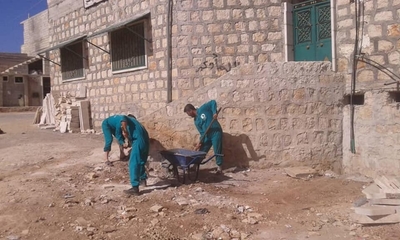The village of Barisha in north Idlib countryside in northwest Syria has become famous in global media as the site of the recent American operation that killed the Islamic State's leader Abu Bakr al-Baghdadi. But what is life like in the village itself? Was there any hint among locals of Baghdadi's presence in the area prior to the raid? To explore these questions, I interviewed Abu Ahmad, a resident of Barisha.
This interview was conducted on 2 November 2019 CE. It is slightly edited and condensed for clarity. Any parenthetical insertions in square brackets are my own.

Q: Can you firstly tell me a little about the village of Barisha generally? Number of inhabitants, number of IDPs, the biggest families in it.
A: Approximately now 15,000 [the total number of people]. Many IDPs in it: I do not have a precise number, but around 5000, most of whom are from Aleppo and Hama. [The biggest families are] Hamdan, Abu Yasin, al-Sayyid.*
Q: How is the current situation regarding services and the humanitarian situation?
A: The situation is very good. More or less everything is available: electricity, water and calm, brother.
Q: Where does the electricity come from?
A: Amperes. You know there is no [national grid] electricity.
Q: Yes, so private generators.
A: Correct.
Q: Regarding the electricity how many hours does it come every day approximately?
A: Currently they have increased the price upon us by 1000 [Syrian pounds]. And it has been reduced by half an hour. It used to come three and a half [hours]. Now three [hours] and the price of the ampere has increased. They have said the mazout [heavy fuel] is expensive and such.
Q: This [1000 Syrian pounds] is the price of the ampere you mean?
A: No. 3500 [Syrian pounds] currently.
Q: And it was previously 2500 [Syrian pounds].
A: Yes.
Q: The mazout comes from where? Turkey?
A: It comes here near to us from the border crossing.
Q: And where does the water come from?
A: We have storage tanks: it [the water] comes to us twice a week.
Q: So the water is from private tankers?
A: Also a little. We have a water network that is operational.
Q: Yes but the storage tanks are affiliated with whom?
A: The village, [they have been] present from before.
Q: I mean are they affiliated with the local council for example?
A: Currently they are responsible for them.
 The local council in Barisha is affiliated with the Salvation Government, which is backed by Hay'at Tahrir al-Sham. |
Q: Some people have said that the village is under the control of Hurras al-Din [al-Qa'ida-loyalist faction]. Is this true?
A: No, not true. We have [people] from all of the factions. There are even cells for the Dawla [Islamic State].
Q: What are the main factions in Barisha?
A: The Hay'a [Hay'at Tahrir al-Sham] controls it. And the rest of the factions: the usual. I am not all that interested. I mean I know a little.
Q: Of course now the village has become famous in the media because al-Baghdadi was living in a house to the west of the village. Were there any rumours about his presence in the area before he was killed?
A: We only heard the aircraft that began bombing. And we did not know the story except on the next day. Had I known I would have informed them about him.
Q: So they give you money.
A: No, because I don't like them [Islamic State].
Q: As for Da'esh [Islamic State] cells in general have there been any rumours about their presence in the area?
A: Yes there are. But no one knows them. But most concentrated in Salqin. They say this.
Q: If someone suspects the presence of the Dawa'esh [Islamic State guys] in the area whom does he inform about them to take the necessary procedures?
A: Someone in the Hay'a, or the amnis [security personnel of the Hay'a] present. And they take their procedures.
Q: Are there any projects of the local council recently?
A: They are working on laying asphalt on the roads now. And there is a project to bring electricity from the border crossing to the nearby areas. There is also a project to light up the roads.
------------------------------------------
(Update 2 November 2019 CE): These family names appear to refer to the IDPs. A person originally from Barisha and resident in Turkey clarifies that of Barisha's original inhabitants, the biggest families are:
- Ameen
- Hamdoush
- Najjar
- Lahla
(Update 3 November 2019 CE): According to the same source, half of the original inhabitants of Barisha are refugees in Turkey, while the number of IDPs in Barisha is double the number of the original inhabitants. That said, no precise figures on original inhabitants and IDPs were offered by the source.

